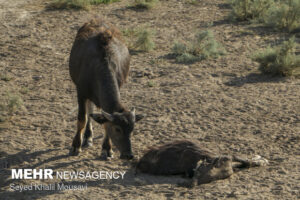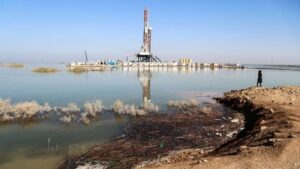Iranian Ministry of Oil practices have forced Ahwazi Arab people to migrate
In the Iranian part of the once-pristine Hor al-Azim wetlands that straddle the Ahwaz-Iraq border at the delta where the main water inlet is located, the Sohrab oil field is turning into a means of destroying the marshes and the marine life thriving there.
The Sohrab oil field is located to the northwest of Ahwaz city, the eponymous capital of the Ahwaz region. Thirty-five oil wells are set to be drilled in the Sohrab oilfield in what remains of the once pristine wetlands that survived the heavy pollution and the drought which the Iranian oil company has exacerbated with catastrophic policies, completing the regime’s destruction of the last remaining refuge for local wildlife, the birds, buffaloes, and hundreds of other species of animals and fish unique to this area.

To enable it to carry out this latest act of wanton environmental devastation, the state oil company has used its lobbying influence and colluded with the regime’s wholly corrupt ‘environmental protection agency’, which has diverted the Karkheh River tributary that once fed the marshlands, not only cutting off the wetlands themselves but also depriving farmers in the area of water for irrigation and depriving the cities of Khafajiyeh and Howeyzeh of their domestic water supply.

During a ceremony to mark the recent World Wetlands Day ceremony, Qassim Saadi, the Iranian parliamentary Speaker representing the Ahwazi cities of Khafajiyeh and Howeyzeh in Missan governorate, urged an immediate end to the oil companies’ excavation work in the area in preparation for the new oilfield, which has already drained around 1,200 hectares of the vast, ecologically unique area, reducing it to a barren wasteland. Without any action, the historic wetlands will be totally lost.
The countdown to the destruction of Hor al-Azim, which is also set to devastate swathes of Ahwaz and southern Iraq, already suffering from critical water shortages, began in 2008 when 8,000 hectares of these wetlands were handed over to the Iranian Ministry of Oil for exploration and extraction.
Many oil companies have since conducted exploratory drilling in the area, with a number of oil rigs already at work there. The resulting pollution has already caused extensive environmental ruin, poisoning plant, animal and marine life in the area, and affecting the migration of the thousands of birds which fly there in winter from around the world. In addition, the roads built to access these facilities have also prevented water from draining or circulating.
In the subsequent 16 years, 37 per cent of the Hor al-Azim wetlands in the Ahwaz region have already dried out, with the ongoing and accelerating expansion of the Sohrab oilfield and plans for the additional 35 rigs in the area set to destroy what remains. As if this weren’t enough, the regime is constructing a 16-kilometre road through the wetlands, further polluting and damaging this once-tranquil natural reserve.
Far from protecting the environment as its name suggests, the regime’s so-called Environmental Protection Organisation approved the implementation of the Sohrab 1 and 2 oilfields in 2018, with the contract for the development of both signed in 2021.
Although the Director General of Environmental Protection in the Ahwaz region announced in August last year that the permit to develop this field had not yet been issued and was set to be reviewed, three months later, in November 2022, the Executive Director of the National Iranian Oil Company officially announced the start of work on developing the oilfield.
In a recent statement quoted by the state-owned Fars News Agency, Saadi said, “Since the 2000s (2001), the environmental organisation has been negligent towards the Hor al-Azim wetlands.”
Saadi lamented the longstanding environmental negligence and destruction caused by the regime’s sugarcane industry in the region, which has seen not only the ecologically unique wetlands but much of the once-fertile farmland seized from Ahwazi farmers, and turned over to water-intensive sugarcane cultivation or oil-drilling, further depleting the waters already reduced by upstream dams diverting water to other areas of Iran.
Referring to the environmental neglect of the marshlands, Saadi said that: “Indifference towards the Ahwazi marshlands means a lack of concern for Ahwazi people’s livelihoods, and unfortunately, since the 2000s (2001), the environmental organisations have not paid any attention to the Hor al-Azim marshland.”
In his address, Saadi pointed out that “the Ministry of Oil is digging the marshes for its oil activities and discharging sewage in Hor al-Azim without paying attention to the development of green spaces.”
Furthermore, Saadi explained that the Hor al-Azim wetland has been divided into several sections by the Ministry of Petroleum, saying: “In the past, these wetlands were unified, but now the wetlands have been divided into several areas by the roads built by the Ministry of Petroleum through the marshes, so these roads caused the wetlands to dry up.”
He stated that “the lives of the people of Khafajiyeh and Howeyzeh and all Ahwazis depend on these wetlands, so it is necessary to form a scientific and academic working group to preserve Hor al-Azim.”
“At the same time, sugar cane water with its toxins and chemicals is poured into the Falahiyeh and Hor al-Azim wetlands, so this policy has caused the marshes to lose their natural texture.”
Finally, Saadi noted: “Because of the excessive oil prospecting activities undertaken by the Ministry of Oil, the entire Ahwaz region has been turned into a desert without living and agricultural possibilities, and these worsening conditions have been forcing the affected Ahwazi people to migrate.”
For the indigenous Arab people of Ahwaz, the words of indigenous Abenaki American-Canadian environmental activist Alanis Obomsawi, lamenting US authorities’ blind greed in destroying the natural environment for profit are equally true for Iran’s regime: “When the last tree is cut, the last fish is caught, and the last river is polluted; when to breathe the air is sickening, you will realise, too late, that wealth is not in bank accounts and that you can’t eat money”.
By DIRS STAFF
